
by Anna Mieczakowski | 30 Sep 2019 | Blog
Ameliot is delighted to be joining the EU MERLIN project partners at the leading global innovation event – the South Summit 2019 – in Madrid between 2-4 October 2019 focused on business and disruptive trends bringing together entrepreneurial and investment ecosystem.
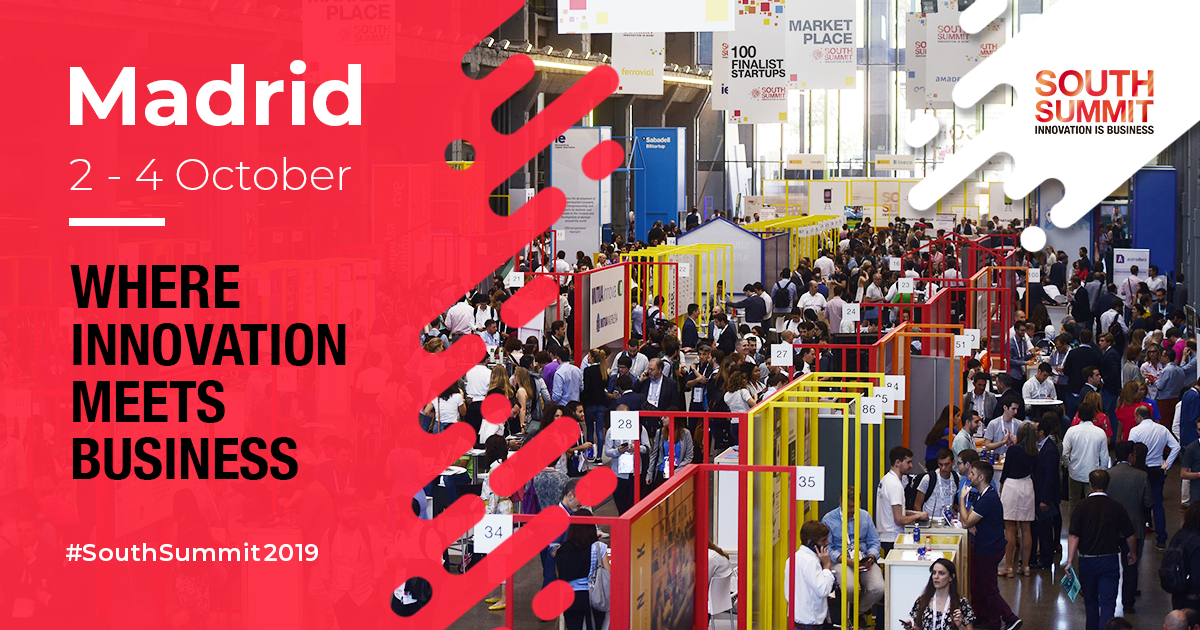
In a range of talks, seminars and exhibitions by representatives of both large and small organisations, we will be discussing the design and impact of modern technology products on human lives across areas spanning fintech, medtech, govtech, insurtech, social impact, environment and mobility. The speakers at this event come from various backgrounds and industries, including Facebook, Twitter, Softbank, NASDAQ, DHL or Amazon, and will share their business and innovation insights on how they went about understanding their customers’ needs and building lasting, yet going with the spirit of times business offerings.
Professor Diego Alonso Cáceres, the MERLIN project’s coordinator with whom Ameliot is collaborating as the MERLIN project’s advisory board member, said of this South Summit 2019 event: “Horizon 2020 MERLIN project is partner in South Summit 2019. Eight companies that have participated in MERLIN activities have been selected to showcase their products and business models. The companies work in domains such as Internet-of-Things, design of new sensors, collaboration tools for medical professionals, new bio-materials, to mention but a few. South Summit is one of the largest entrepreneurship-related events that take place in Spain, and as such, it is a great opportunity to both disseminate the outcomes of MERLIN project, and help our participants to push their business forward”.
The MERLIN project supports market-oriented researchers, SMEs and startups across Europe, in considering the full potential of their research and shaping ideas and outputs into innovations to be ready for market validation and commercialisation, by using modern needs-first, market-led methodologies.
 |
The MERLIN ICT Programme has received funding from the European Union’s Horizon 2020 research and innovation programme under grant agreement No 780460. |
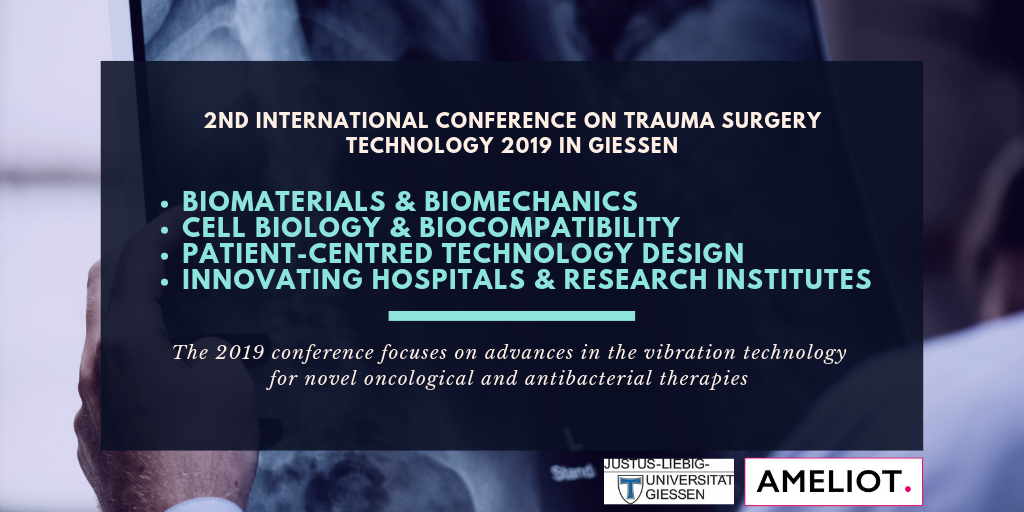
by Anna Mieczakowski | 21 Aug 2019 | Blog
For the second year running, Ameliot will co-host an international conference on medical technology design in trauma surgery in collaboration with the Justus Liebig University of Giessen, funded by the DFG German Research Foundation. This conference will take place between 11-13 October 2019 in Giessen, Germany.

The 2019 conference will bring together a host of experts in the fields of medical devices, nanotechnologies, user-centred design, regenerative medicine and trauma rehabilitation to explore promising concepts and their development in medical technologies for trauma surgery, with a particular focus on the role of nascent vibration technology in improving oncological and antibacterial therapies. The overarching goal is to explore trauma rehabilitation concepts and their development based on state-of-the-art patient-centred technology design, and to improve patient outcomes through the design of optimal technology that assists both patients and surgeons. Regenerative rehabilitation, where trauma patients are treated by methods of regenerative medicine, is an emerging field.
This conference will focus on discussing the following overarching themes related to novel vibration technologies in trauma rehabilitation to increase the malignant cell destruction capability in oncological therapies and reduce bacteria that could cause post-surgical complications due to infection:
- Biomaterials and biomechanics: Improving the strength, endurance and efficacy of biomaterials for therapeutic applications
- Cell biology and biocompatibility: Enhancing therapies and patient outcomes by novel cell vibration techniques
- Patient-centred technology design: Putting patients at the centre of therapeutic solutions in an interconnected healthcare setting
- Organisational innovation: Innovating performance of hospitals and research institutes by considering all stakeholders and contexts of use.
As illustrated in the below image, the conference organisers and participants are collaborating with the DFG German Research Foundation to discuss the potential of developing a vibration bioreactor under the premise that cells react to vibration and can reduce harmful bacteria.
 Ameliot has been delighted to contribute to this 2nd international conference because the design of healthcare and medical technologies and experiences that puts the patients and clinicians at the heart of them lies at the core of what we do.
Ameliot has been delighted to contribute to this 2nd international conference because the design of healthcare and medical technologies and experiences that puts the patients and clinicians at the heart of them lies at the core of what we do.


by Anna Mieczakowski | 20 Aug 2019 | Blog
Any hardware development, lean or otherwise, mustn’t be considered without also focusing on customer needs. Because frankly – what’s the point in expending valuable time and money – resources which startups typically don’t have – implementing hardware features which users will not want?
Ameliot is delighted to announce that we have been invited to deliver a talk on how startups and young companies can most efficiently and effectively go about creating LEAN HARDWARE whilst also focusing on the principles of LEAN User Experience (UX) to create an optimal customer need for that hardware at an event organised by Poznan’s Park of Science and Technology as part of the EU-funded MERLIN project in collaboration with SIBB e.V. (ICT & Digital Business Association Berlin-Brandenburg) and Fraunhofer HHI/CINIQ Smart Data Forum.
This event will take place on the 25th of September 2019 at Berlin’s Smart Data Forum and Ameliot’s Dr Anna Mieczakowski’s talk will overlap both the Hardware Development and Customer Development models and take the participants through the phases of an electronic product creation from concept through to manufacture with the aim to exactly pinpoint what you need to do at each stage to determine what % of users are likely to want each hardware feature under consideration.

This LEAN HARDWARE WITH UX talk will cover the following topics:
- Just as its definition suggests the value of Lean is to “provide the most value form the customer perspective, while consuming the fewest resources and utilising the talents of the people who do the work” (Lean Enterprise Academy). Thus, the two key principles of Lean Hardware focus on: the end customers and utilisation of fewest resources possible. With these principles in mind, this talk will cover the Lean UX methods and advice on most cost-effective methods for hardware creation.
- Introduction to rapid, lightweight, Lean UX technique, which works in alignment with Agile development method for hardware focusing on quick, iterative cycles, to quickly develop hardware prototypes, gather feedback from past and potential new customers, and quickly pivot initial designs based upon feedback from customers.
- Introduction to the Hardware Development Cycle’s requirements, design, prototyping, testing and manufacture stages, how they can be applied in a leaner fashion and how Lean UX maps onto this Lean Hardware model with its ‘think’, ‘make’, ‘check’ stages in order to produce a minimal viable product.
- Discussion on the example of the super successful Raspberry Pi hardware which undertook several refinements from the original plan of hardware features to finally produce the Raspberry Pi Classic product successfully sold to millions of people.
- Discussion on how focus on customer needs in product development from the outset will result in the validation of the minimal features that the hardware should have, thus saving time and money that would be otherwise expended on designing and developing unnecessary features.
- Introduction to hardware certification and testing to position the device on the market and how this can be achieved as quickly as possible without compromising quality.
This event is aimed at innovators, representatives of technology companies, startups and scientists who have a product or idea, but lack the knowledge or skills to lead it in business.
JOIN US BY REGISTERING FOR THIS FREE EVENT AT: https://bit.ly/2ZkVsaV
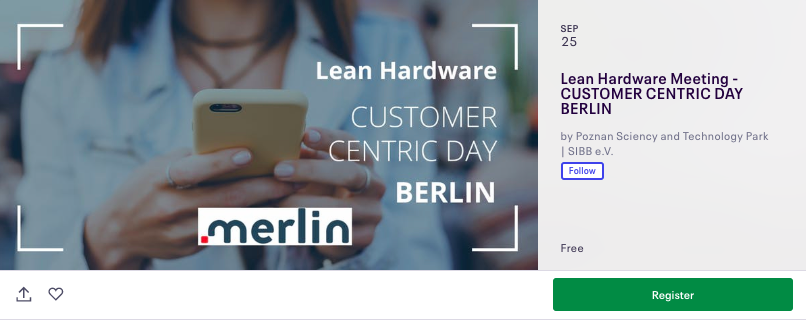
About MERLIN project
MERLIN (Methodologies for Researcher Led Innovations) Programme supports market-oriented researchers, SMEs and start-ups across Europe, to consider the full potential of their research and to shape ideas and outputs into innovations to be ready for market validation and commercialisation, by using modern needs-first, market-led methodologies. MERLIN offers a range of dynamic workshops and relevant training to guide researchers and businesses on the journey to commercialisation. The programme, consisting on 8 workshops including one workshop the aforementioned workshop on LEAN HARDWARE, will equip participants with knowledge, skills and network to generate market-led business models to unlock potential and accelerate this journey.
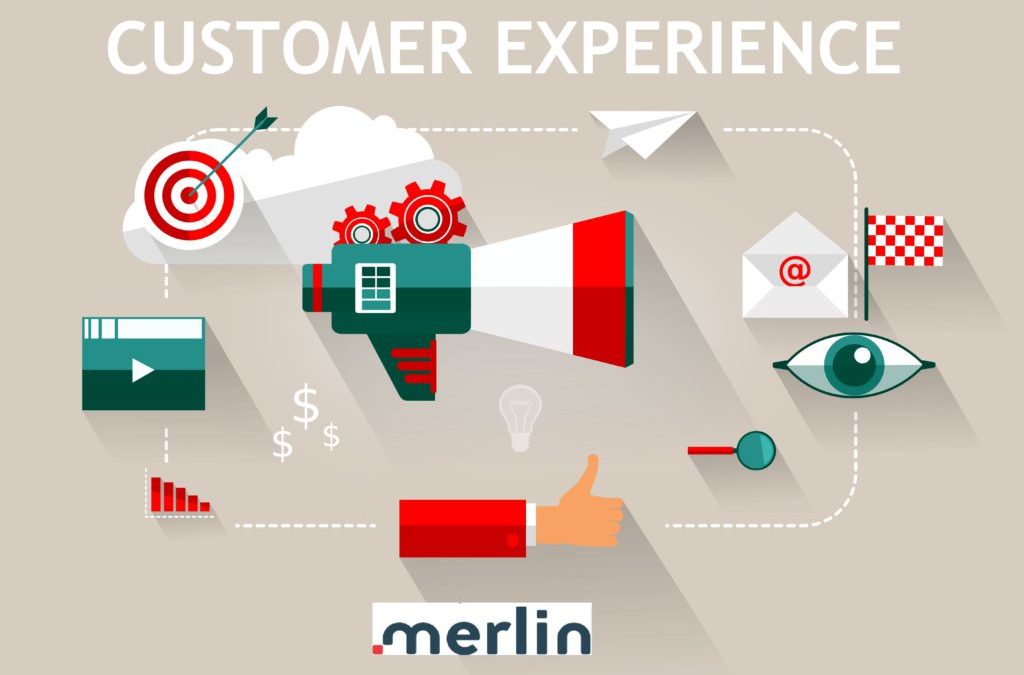
by Anna Mieczakowski | 7 Jun 2019 | Blog
Between September 2018 and April 2019, Ameliot developed and delivered a series of workshops and workshop materials on Customer Discovery and Customer Experience in Cambridge, Poznan and Warsaw for clients including the St Johns Innovation Centre and Poznan’s Park of Science and Technology.
The client and their needs are ultimately the key to the success of any product or service, and there are many examples of well-known companies that have initially struggled to truly understand who their target users are. For example, Coca-cola was supposed to be a cure for headache and penicillin was created by accident, while looking for a typhoid vaccine.
The workshops were mainly aimed at innovators, representatives of technology companies and scientists who have a product or idea, but lack the knowledge or skills to lead it in business. The workshop helped these individuals and organisations to identify who their target customers are, create a product that has a real need and provided them with tools for growing a large customer following.

Photo from the Customer Experience workshop in Poznan, Poland.
During this workshop, participants were introduced to:
- The Customer Development methodology helping to capture and identify customer needs and then to create products and services that customers will really be delighted with;
- Steve Blank’s “4 steps to epiphany” – i.e. four steps to validate and implement business ideas within the Customer Development methodology;
- Customer Discovery – why it is worth asking who the real customers are;
- Problem Statement – how to check if the business solves the right problem;
- Customer vs. User – how to find out whether the potential clients are willing to pay for a solution;
- Research and interviews with clients – how to ask the right questions;
- Customer Validation – how to check if the client/product assumptions are correct;
- Organising feedback from customers into tasks that enable product development;
- New methodologies and tools for segmentation of various types of clients, as well as interpretation of opinions and functional and emotional customer needs;
- Tools for capturing and analysing customer needs and integrating feedback into the product development process;
- Various useful methods and tools for creating effective, usable and accessible CX design – Customer Journey, Personas, Ethnography, Content Analysis, etc.;
- Ways of economically creating prototypes of products and services, as well as usage of iterative testing methods;
- Access to and demonstrations of free simulators and online calculators to help estimate the cognitive, physical and sensory capabilities of prospective clients to estimate the demand that the product is placing on those clients.
Ameliot’s Director, Dr Anna Mieczakowski, said the following about the importance of this workshop series: Let’s face it – design is everywhere, from everything we are wearing, looking at, hearing or holding. That’s why the UX (User Experience) practice is so important during the design of any product, service or experience, because it helps organisations of all types and sizes to truly understand who their customers are by looking deeply into how people think about and act with products and services. UX will help you to humanise your technology, differentiate from competition and gain a larger customer following, as people always fall in love with designs that love and appreciate them.

by Anna Mieczakowski | 20 Dec 2018 | Blog
Our Anna Mieczakowski has been invited to be a guest speaker at the MERLIN EU Programme’s next workshop titled “Interpreting the Customer and UX”, which will be held at the St John’s Innovation Centre in Cambridge on the 22nd January 2019. During this workshop, participants will learn how to secure and assess customer input to drive their innovation forward, understand the importance of User Experience (UX) in the design of a product or process, learn tools to help prioritise and integrate UX feedback into product development. Find out more and register for this FREE event here.
Anna is very excited to be contributing her UX expertise to the series of MERLIN workshops for start-ups and SMEs and emphasised the important role of UX in product and service design by saying:
“Let’s face it – design is everywhere, from everything we are wearing, looking at, hearing or holding. That’s why the UX (User Experience) practice is so important during the design of any product, service or experience, because it helps organisations of all types and sizes to truly understand who their customers are by looking deeply into how people think about and act with products and services. UX will help you to humanise your technology, differentiate from competition and gain a larger customer following, as people always fall in love with designs that love and appreciate them”.
Claire Johnsen from the MERLIN Programme, who will co-present the workshop with Anna, said:
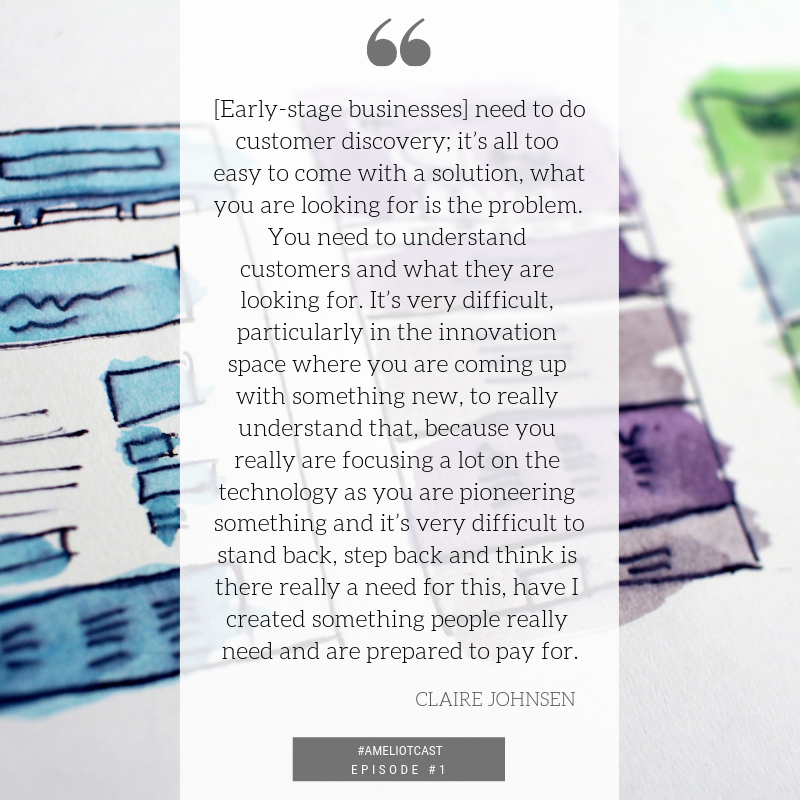
About MERLIN project
MERLIN (Methodologies for Researcher Led Innovations) Programme supports market-oriented researchers, SMEs and start-ups across Europe, to consider the full potential of their research and to shape ideas and outputs into innovations to be ready for market validation and commercialisation, by using modern needs-first, market-led methodologies. MERLIN offers a range of dynamic workshops and relevant training to guide researchers and businesses on the journey to commercialisation. The programme, consisting on 8 workshops, will equip participants with knowledge, skills and network to generate market-led business models to unlock potential and accelerate this journey. MERLIN will organise 2 meetups with potential partners, customers and investors by the end of each year, to help participants grow. Moreover, selected participants will be invited to participate in Startup Europe events.






 Ameliot has been delighted to contribute to this 2nd international conference because the design of healthcare and medical technologies and experiences that puts the patients and clinicians at the heart of them lies at the core of what we do.
Ameliot has been delighted to contribute to this 2nd international conference because the design of healthcare and medical technologies and experiences that puts the patients and clinicians at the heart of them lies at the core of what we do.







Recent Comments